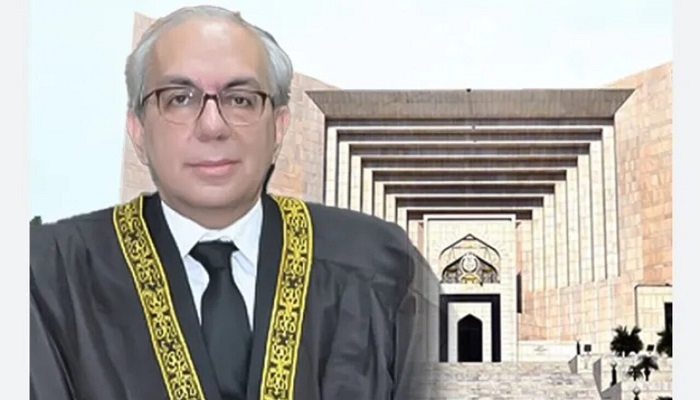ISLAMABAD: Justice Munib Akhtar has withdrawn himself from a Supreme Court (SC) bench, headed by Chief Justice of Pakistan (CJP) Qazi Faez Isa, which was reviewing a plea regarding Article 63-A.
The five-member bench originally included Justices Qazi Faez Isa, Munib Akhtar, Aminuddin Khan, Jamal Khan Mandokhail, and Mazhar Alam Khan Miankhel. However, Justice Akhtar withdrew from the bench, citing concerns in a letter to the Supreme Court Registrar.
His letter mentioned reservations about the reconstitution of the Practicing and Procedure Committee.
The case was subsequently heard by a four-member bench, led by Chief Justice Isa, without Justice Akhtar. In court, the CJP read out the final paragraph of Justice Akhtar’s letter and postponed the hearing until the following day.
Despite the Chief Justice’s request, Justice Akhtar did not rejoin the bench. Furthermore, Chief Justice Isa decided not to include Justice Akhtar’s letter in the official court record.
In his letter, Justice Akhtar expressed unease about serving on a bench formed by the reconstituted Practicing and Procedure Committee. He clarified that while he wasn’t officially recusing himself, he could not participate in this specific bench. He also requested that his letter be included in the case record, though this request was denied by Chief Justice Isa.
Chief Justice Qazi Faez Isa, while acknowledging Justice Akhtar’s views, emphasized that no judge could be compelled to hear a case. He also underscored the importance of the review case, which had been pending for over two years and involves significant constitutional matters. Although the CJP welcomes differing perspectives and debate, he reiterated that Justice Akhtar’s letter would not become part of the official record.
The SCBA review petition dates back to 2022 when the Supreme Court Bar Association (SCBA) filed a plea seeking a review of the Supreme Court’s interpretation of Article 63-A in a presidential reference.
The SCBA contested the court’s opinion on not counting votes of defecting members, arguing that it violated the Constitution. The petition claimed that under Article 63-A, defecting members should only be de-seated, not have their votes disregarded.
In a May 17, 2022, decision, a divided five-member Supreme Court bench, led by then-CJP Umar Ata Bandial, ruled that defecting members’ votes would not be counted. The decision, made by a 3-2 majority, held that such defections undermine the integrity of democracy.
Article 63-A of Pakistan’s Constitution outlines the consequences for lawmakers who defect from their political parties. If a member votes or abstains contrary to party instructions in specific situations—such as electing a prime minister or chief minister, or during votes of confidence, no-confidence, money bills, or constitutional amendments—the party head can file a declaration with the speaker. If confirmed by the Chief Election Commissioner (CEC) within 30 days, the lawmaker’s seat becomes vacant.
















